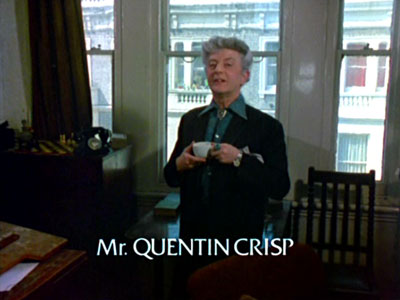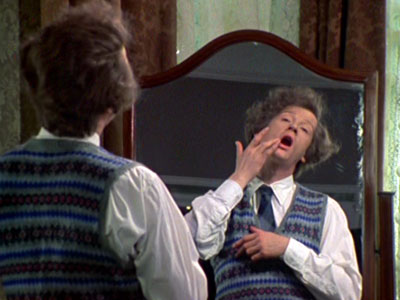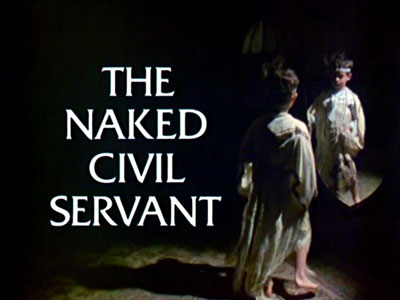 The Naked Civil Servant created a furor in 1975 when it premiered on PBS in North America with viewers threatening to yank their support. It was a film ahead of its time about a man even more ahead of his time. The Naked Civil Servant created a furor in 1975 when it premiered on PBS in North America with viewers threatening to yank their support. It was a film ahead of its time about a man even more ahead of his time.
Despite the uproar, the film remained on the air and garnered strong critical acclaim, including a Best Actor BAFTA for John Hurt and the British Academy's Desmond Davies Award for director Jack Gold.
The Naked Civil Servant is based on the autobiography of Quentin Crisp, a man struggling to live an openly gay, flamboyant lifestyle during a time when homosexuality was against the law in Britain.
His outlandish behavior shocked the intolerant pre-WWII British society and provoked frequent homophobic attacks, but Crisp staunchly refused to compromise his lifestyle and went on to become a cult celebrity and an international gay icon, a 20th-Century Oscar Wilde.
 John Hurt's portrayal of Quentin Crisp is nothing less than superb as he fights back against society's intolerance, ostracism and violence with pointed, razor-sharp humor. John Hurt's portrayal of Quentin Crisp is nothing less than superb as he fights back against society's intolerance, ostracism and violence with pointed, razor-sharp humor.
This 1975 Thames Television adaptation of Mr. Crisp's autobiography is now digitally remastered and cleaned up from original sources. The DVD extras include: commentary by star John Hurt, director Jack Gold, and executive producer Verity Lambert; and Deja Vu with Quentin Crisp, where Crisp provides his observations on British and American culture.
|
Director: Jack Gold
Production Company: Thames Television
Producer: Barry Hanson
Screenplay: Philip Mackie
Autobiography by Quentin Crisp
Photography: Mike Fash
Music: Carl Davis
1975, color, 85mins
|
Cast:
John Hurt (Quentin Crisp)
Liz Gebhardt (art student)
Patricia Hodge (ballet teacher)
Stanley Lebor (Mr Pole)
Katharine Schofield (Mrs Pole)
Stephen Johnstone (young Quentin)
Complete cast list is here.
|
|
 "No matter what they say about each of us being unique, Quentin Crisp was, as it were, more unique than anyone has ever been. After a life of relative invisibility—as invisible as any man could be with Maggie Smith-dyed red hair, jungle-red nails and a personal style that made Truman Capote seem like a stevedore by comparison, Crisp became famous simply for being who he was. In 1975, his autobiography became an infamous but correctly celebrated film starring John Hurt in a tour de force performance. Though Crisp was very much alive at the time and well known on the talk show circuit, Hurt manages both to do a spot-on impersonation, yet make the role into a beautifully nuanced and complex human being. Like Capote, Crisp didn't speak so much as pronounce, yet Hurt manages to deliver the ornately constructed lines with a compelling underpinning of truth about one man's pride, pain and unwavering self-awareness. They say Crisp was an icon, but to use that term almost belittles him. He was a man who knew truths, and Hurt honors the man and those truths brilliantly. Crisp lived long enough to see his unabashed sense of personal style adopted widely in gay culture. By that time, it was safer. When Crisp did it, it was a different time, as this extraordinary film explains." — David Wiegand "No matter what they say about each of us being unique, Quentin Crisp was, as it were, more unique than anyone has ever been. After a life of relative invisibility—as invisible as any man could be with Maggie Smith-dyed red hair, jungle-red nails and a personal style that made Truman Capote seem like a stevedore by comparison, Crisp became famous simply for being who he was. In 1975, his autobiography became an infamous but correctly celebrated film starring John Hurt in a tour de force performance. Though Crisp was very much alive at the time and well known on the talk show circuit, Hurt manages both to do a spot-on impersonation, yet make the role into a beautifully nuanced and complex human being. Like Capote, Crisp didn't speak so much as pronounce, yet Hurt manages to deliver the ornately constructed lines with a compelling underpinning of truth about one man's pride, pain and unwavering self-awareness. They say Crisp was an icon, but to use that term almost belittles him. He was a man who knew truths, and Hurt honors the man and those truths brilliantly. Crisp lived long enough to see his unabashed sense of personal style adopted widely in gay culture. By that time, it was safer. When Crisp did it, it was a different time, as this extraordinary film explains." — David Wiegand
|
DVD released in U.S. on May 29, 2007.
|